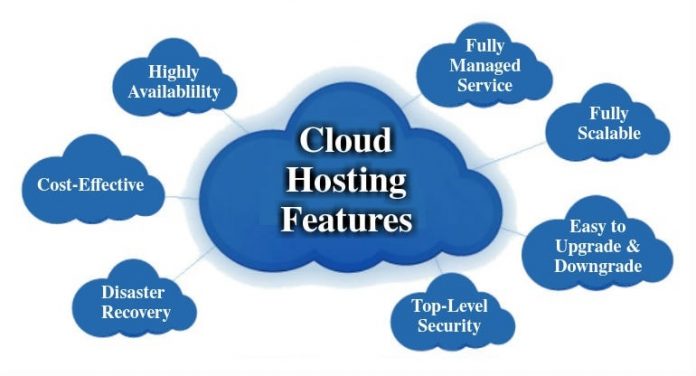Prior to now, high-tech industries on the leading edge of digital technology were the only ones using cloud computing. Many businesses now use cloud technologies regularly, changing everything from e-commerce to news media and social networks.
Here, we will show you how to use the current environment of cloud hosting possibilities and how to get the most out of your website and app’s resources. So, let’s get started!
Cloud Hosting: A Quick Glance
When you host a website or web-based application or planning to do something similar in the future, then probably you have come across the term cloud hosting service in India.
Cloud hosting distributes web hosting duties across a network of physical and virtual servers, which are frequently dispersed across various geographical locations, in contrast to traditional web hosting, which uses a single physical server to host content.
Architecture and Charming Features
Cloud hosting uses an infrastructure that is entirely based on the cloud to handle all of your web hosting requirements. Your app or website will be hosted using all of the advantages and benefits of cloud computing since there won’t be any on-premises servers to manage.
Aside from fully scalable resources, flexible payment and pricing options, support for both SQL and NoSQL databases, and automated hosting solutions, cloud hosting services have several benefits.
Distributed Infrastructure:
Instead of depending on a dedicated server in a single physical location, cloud servers are distributed over several workstations that can be found anywhere.
The distributed architecture of the majority of cloud services is built up of sizable data centers run by specialist vendors. These have integrated power and cooling systems that guarantee maximum efficiency. But, they also need specialized maintenance personnel to handle their equipment daily.
Resources Scaled to Meet Organizational Needs:
In contrast to typical in-house hosting from a single server, scaling up your operations requires adding new units or modernizing existing equipment. Poor service or even downtime could occur from the time-consuming task of making sure your servers can keep up with the demands of a growing web application.
When you outsource your company’s web hosting to a cloud platform, there is no need to update, buy new servers, or purchase more disk space. You may automatically boost resources in response to changing demands when you choose cloud architecture as your hosting solution.
Flexibility in Pricing and Payments:
A simple alternative to hosting a website internally is signing up for a basic web hosting provider. You will then have access to a specific collection of resources on a single server. All you have to do is register your domain name before determining how much RAM, CPU cores, or bandwidth you need.
To have even more flexible price options, take into account the improved scalability of cloud hosting plans. When you need extra server capacity, you don’t always have to invest in pricey hardware upgrades. Many cloud hosting options let you simply pay for the resources you use.
Pay-per-use pricing is a common method for pricing cloud hosting services. If you have a hosting account with a cloud platform that also offers other cloud services, charges may be merged for convenience and cost control.
Support for SQL and NoSQL Databases:
Make sure your host supports the database types your application uses before hosting a web application.
The two most prevalent forms of databases are SQL and NoSQL. Additionally, the two most widely used SQL solutions are MySQL and Microsoft SQL Server. A couple of good examples of NoSQL databases include Redis and MongoDB.
Cloud hosting can support both databases. Therefore, it is the ideal solution for developers to work with it.
Types of Cloud Hosting Services India
Well, there are four main categories of cloud. They are mentioned below:
Public Cloud Hosting:
Public cloud hosting is the cloud equivalent of using a shared server in a conventional hosting setup.
When hosting in a public cloud, a lot of virtual machines share hardware. The virtual server’s resources, such as its processing power and disk space, are not pooled with those of other accounts, in contrast to traditional shared hosting. Therefore, data centers are the only places where you share space.
Private Cloud:
Public cloud hosting isn’t always unsafe. But, you might be uncomfortable running operations that need a high level of security on the same hardware as other users. The best cloud solution for you in this situation is private cloud hosting.
When using private cloud hosting, you don’t share infrastructure with other users. You keep a physically independent cloud server in addition to keeping the resources you use apart from other cloud accounts.
Hybrid Cloud:
Public cloud, private cloud, and on-premises computing are all combined in a hybrid cloud system. With orchestration, administration, and application portability across all architecture types, hybrid cloud solutions are meant to create a unified, flexible, and cohesive distributed computing environment.
Managed Cloud:
Managed cloud hosting is an addition to the cloud concept of outsourcing essential IT operations. In addition to the physical infrastructure and virtual machines needed to host your web applications, a managed cloud service offers complete infrastructure and application-level support.
Conclusion:
Hosting services in India is one of the best services to boost your website. Cloud hosting service in India offers several gains to organizations that make it an obvious choice for several internet-based applications.




